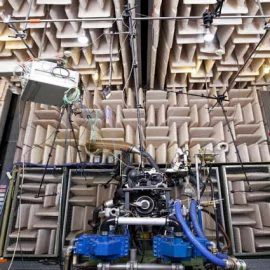hirschaplin
Petroleum
Hello,
If you have a range of various models of roots blowers, what is the path to be able to predict sound level at various operating points for each machine in the range?
Is full testing and noise measuring of each rpm and pressure point the only way to go or is it possible to determine the sound level through calculations?
If the range consist of 10 different models and each model can operate at a rpm between 1000 rpm and 4000 rpm, and operating differential pressure can vary between 50 mbar to 1250 mbar. Differential pressure seems to be affecting the sound very much.
What would be a sufficient testing procedure? If you test at every 100 rpm it would be 40 different rpms (1000, 1100, 1200, 1300 etc.) for each model. If you would test each rpm at 10 different pressures that is ~400 testing points for each model. Or 4000 testing points for the full range. That is hell of a testing program... there most be a cheaper way.
I also guess that the inlet pressure will affect the result. I guess that the sound is different if the inlet pressure is 1000 mbar and outlet pressure is 2000 mbar compared to if inlet pressure is 5000 mbar and outlet pressure is 6000 mbar.
I also guess that the gas composition will affect the test result as it effect the speed of the sound. If you have hydrogen or helium that is very different from air or a more heavy gas.
Basically, what is a realistic/efficient approach to be able to predict the sound level of a roots type blower at a certain operating point considering pressure, temperature and gas composition?
It is easy to determine the working frequency or pocket passing frequency of the machine. Can that be used somehow to calculate the sound level?
If you have a range of various models of roots blowers, what is the path to be able to predict sound level at various operating points for each machine in the range?
Is full testing and noise measuring of each rpm and pressure point the only way to go or is it possible to determine the sound level through calculations?
If the range consist of 10 different models and each model can operate at a rpm between 1000 rpm and 4000 rpm, and operating differential pressure can vary between 50 mbar to 1250 mbar. Differential pressure seems to be affecting the sound very much.
What would be a sufficient testing procedure? If you test at every 100 rpm it would be 40 different rpms (1000, 1100, 1200, 1300 etc.) for each model. If you would test each rpm at 10 different pressures that is ~400 testing points for each model. Or 4000 testing points for the full range. That is hell of a testing program... there most be a cheaper way.
I also guess that the inlet pressure will affect the result. I guess that the sound is different if the inlet pressure is 1000 mbar and outlet pressure is 2000 mbar compared to if inlet pressure is 5000 mbar and outlet pressure is 6000 mbar.
I also guess that the gas composition will affect the test result as it effect the speed of the sound. If you have hydrogen or helium that is very different from air or a more heavy gas.
Basically, what is a realistic/efficient approach to be able to predict the sound level of a roots type blower at a certain operating point considering pressure, temperature and gas composition?
It is easy to determine the working frequency or pocket passing frequency of the machine. Can that be used somehow to calculate the sound level?

